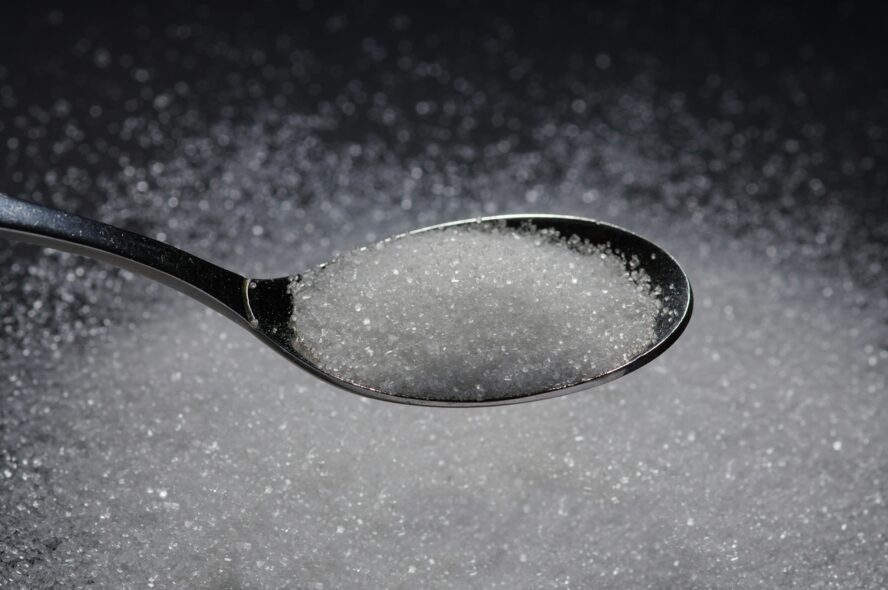Is Stevia Bad for You? What a Registered Dietitian Really Thinks
If you want to reduce your sugar intake, stevia could be a good substitute.

Stevia has long been advertised as a healthy alternative to table sugar and low-calorie artificial sweeteners. Researchers typically agree that stevia is safe for use as a sweetener, and it may even have some health benefits. However, recent reports show mixed results regarding the drawbacks of stevia.
Research on stevia and gut health reviewed in 2022 found it was unclear whether stevia supports or imbalances a healthy gut microbiome1. One study in 2016 also explored stevia’s potential to act as an endocrine disruptor in the body2. Finally, there are several possible common side effects like nausea and bloating that are worth being aware of.
This article will explore the research behind this natural sweetener to compare stevia against other options and answer one critical question: “Is stevia healthy?” Read on to learn more about stevia leaf extract, possible stevia side effects, and who should avoid stevia intake.
What Is Stevia?
Stevia is a natural zero-calorie sweetener derived from the leaves of a South American plant. It is commonly used as a sugar substitute in various foods and beverages, so you may already be consuming stevia without knowing it.
The Plant vs. The Product
Stevia rebaudiana is the plant from which stevia sweetener is made. The sweet compounds are found in the leaves of this plant. Stevia sweetener, also referred to as high-purity stevia leaf extract, contains 95% or greater steviol glycosides. It’s important to note that only stevia leaf extract, AKA stevia sweetener products, have been approved by regulatory agencies for use in food and beverages3.
Want more nutrition and wellness info on the latest health trends? Sign up for the newsletter for more well-researched, non-toxic living guidance and smart wellness advice.
How Stevia Is Made
The sweet flavor of stevia comes from steviol glycosides (SGs) extracted from the leaves of the stevia plant2. The leaves of Stevia rebaudiana contain more than 30 different SGs. Due to this abundance of SGs, stevia is typically ~250-300 times sweeter than sucrose (also known as standard table sugar)4.
To create stevia products, the leaves of the stevia plant are crushed and steeped in hot water. The liquid extract is then filtered to separate any remaining solid components of the leaves, and the high-purity plant extracts are further purified using water and/or food-grade alcohol. This extract can then be processed to create powder or liquid stevia products.
The Science Behind Stevia Safety

FDA Approval and Regulatory Status
As of 2008, the Food and Drug Administration (FDA) reported stevia to be generally recognized as safe (GRAS)5. Similarly, both the Joint Expert Committee on Food Additives and other international food safety agencies concluded in 2005 that stevia could be used without concerns about genotoxicity6.
As far as a safe dosage of stevia, the acceptable daily intake (ADI) of SGs in humans is 12 mg of high-purity stevia extracts per kg of body weight. For reference, for a 150-pound person, this comes out to just under 40 packets daily (based on 21 mg packets). However, due to potential side effects, you should still always aim to consume stevia in moderation. And always consult your primary care physician when making any changes to your diet.
The Long-Term Safety of Stevia
Despite the EFSA Panel on Food Additive and Flavourings (FAF Panel) reporting in 2023 that there is no safety concern for steviol glycosides7, stevia is a relatively new sweetening product. Long-term studies must be conducted before any long-term effects can be confirmed.
Debunking Common Stevia Health Concerns
The Gut Microbiome Question
A 2024 study found that stevia did not cause any large-scale changes in the gut microbiota diversity as compared to the control group8. Another 2025 study confirmed such findings by showing that stevia intake has a minimal, nearly neutral effect on gut microbiota composition.
Any visible effect it did have on the gut was a positive one, with stevia showing promise as a prebiotic. This means it’s possible that stevia can promote “good” bacteria like Lactobacillus and Bifidobacterium, although it has not been FDA-approved as a treatment for any health issues9.
Hormone Disruption Claims
There are claims that stevia can cause endocrine disruption due to its steroidal structure. However, further research on this topic shows inconsistent findings so far. More research is needed before any conclusions can be drawn10.
Kidney and Liver Function
A study that fed mice stevia over 16 weeks in 2020 found that they saw the increase of certain proteins responsible for inflammation in the kidneys and liver11. Researchers worried that this could cause damage to the organs over time.
However, additional research seems to contradict this, with other studies showing that stevia intake can actually help lessen liver and kidney damage12. In fact, animal studies on stevia show that it can help improve the health of those with non-alcoholic fatty liver disease (NAFLD) by modulating gut microbiota, hepatic metabolites, and bile acid levels13.
Several studies report improvements in kidney function markers for chronic kidney disease patients who were given stevia, including serum creatinine and microalbumin levels. The antioxidant properties of stevia, such as polyphenols like phenols, phenolic acids, and flavonoids, may also help protect kidney tissues from oxidative stress14.
When Stevia Products Become Problematic
Despite the general consensus that stevia is safe to incorporate in your diet, there are still some forms of consumption that may pose more risks than others. Let’s examine these cases to answer: Is stevia leaf extract bad for you?
Stevia Blends With Hidden Additives
When shopping for a stevia product, check the ingredient label to make sure it’s not a stevia blend. Blends are best avoided because some contain erythritol as a bulking agent. Unlike many other non-nutritive sweeteners (NNS), erythritol is nearly fully absorbed in the small intestine and excreted intact. Because of this, erythritol can potentially build up in the body, especially if a person regularly eats large amounts through processed foods and beverages15.
Not only can excessive erythritol intake sometimes cause digestive symptoms like bloating, gas, and diarrhea, but research shows that long-term exposure to erythritol can increase your risk of cardiovascular events16,17.
Other hidden additives in stevia blends that may compromise health benefits include maltodextrin and dextrose, which can sometimes be found in blends marketed as “natural.” Unlike stevia, these additives have a high glycemic index, which means they can lead to spikes in blood glucose levels18. The possibility of glucose spikes can be concerning for individuals with diabetes or insulin resistance, who may think they are purchasing a diabetes-friendly sweetener.
Quality Control Issues and Counterfeit Products
After you’re done checking the ingredient label for additives, it’s important to look for stevia products that clearly state the purity of SGs. The label should state that it contains 95% or higher SGs, and it should ideally specify the percentage of Reb-A or other SG that it contains.
Just like when you’re purchasing dietary supplements, you should also look for trusted brands that have undergone third-party testing and have certifications like National Sanitation Foundation (NSF), FSSC 22000, ISO Certified status, or Good Manufacturing Practices (GMP), which all demonstrate that the product was made under strict safety and quality standards. If the stevia has a particularly bitter or metallic aftertaste, you may have purchased a counterfeit product.
Stevia vs. Other Sweeteners: The Complete Comparison
Stevia vs. Artificial Sweeteners
While stevia and artificial sweeteners are both low-calorie (or zero-calorie!) alternatives to sugar, there are some key differences to consider.
Aspartame

Artificial sweeteners like aspartame (Equal, NutraSweet) have become a staple in many restaurants, cafes, and households due to the growing concern around the health impact of sugar intake. But is a low-sugar profile enough to balance out the possible health risks of long-term aspartame intake?
A 2024 review of artificial sweeteners shows that long-term intake may induce inflammation, which over time can increase risk of chronic diseases in the brain and body19. Noted risks of chronic aspartame intake include:20,21
- Increase in risk of insulin resistance and type 2 diabetes
- Increased incidence of cardiovascular disease
- Increase in risk of nonalcoholic fatty liver disease (NAFLD)
- Gastrointestinal symptoms
- Increased risk of certain types of cancer
Sucralose
Sucralose, like stevia, is a zero-calorie sweetener — but unlike stevia, it’s not natural. Sucralose is even sweeter than stevia (to the tune of 600 times sweeter than table sugar)22. And if you’re swapping out your sugar for sucralose to avoid health risks, you may want to think twice.
A 2024 study review reports that sucralose may have possible links to systemic inflammation, metabolic diseases, disruptions in gut microbiota, liver damage, and toxic effects at the cellular level23.
Stevia vs. Other Natural Alternatives
Monk fruit
Monk fruit, also known as monk fruit extract (MFE), is made by water extraction of the fruit of Siraitia grosvenorii24. Like stevia, it is a natural zero-calorie sweetener and is a great option for those looking to lose weight or cut sugar from their diet.
Research on MFE found that it can reduce blood glucose levels after meals by 10 to 18 percent and insulin responses by 12 to 22 percent25. Unlike artificial sweeteners, monk fruit extract does not leave any aftertaste, and side effects are few and far between — although, like stevia, it can also cause bloating or gas, especially if the monk fruit product you choose is blended with sugar alcohols26.
Honey
A drizzle of honey in tea or on a muffin can make your morning sweeter. It also includes a variety of important nutrients like potassium, calcium, iron, and magnesium — as well as antioxidant-rich phenolic compounds27. These make honey a great alternative to table sugar.
However, just one teaspoon of honey is 21 calories, which can quickly add up depending on how liberally you’re using it. If you’re looking to minimize your calorie intake as much as possible while still enjoying the occasional sweet boost, stevia may be the better natural option.
Potential Stevia Side Effects
Although stevia is relatively safe for most people, there are some that may experience side effects after consuming it. Stevia side effects are mostly mild and may include bloating, nausea, diarrhea, abdominal pain, and in rare cases, dizziness or numbness.
Allergic reactions to stevia like itching, swelling, or breathing difficulties are rare, but may occur in some people, especially those sensitive to plants in the Asteraceae family like ragweed. However, there isn’t enough reliable information to know what the definitive range of stevia side effects might be.
Who Should Avoid or Limit Stevia
Medical Conditions and Medication Interactions
Despite the FDA approval, those with certain health issues should still take caution when consuming stevia. This includes those with diabetes, high blood pressure, or heart disease. Those who are taking medication to treat existing conditions should be especially cautious, as stevia may compound the effects of these medications.
For example, stevia may lower blood sugar levels and enhance insulin release. Although this may help benefit blood glucose management, those who are on diabetes medications may risk experiencing dangerously low blood sugar28. Similarly, stevia can lower blood pressure, so those with hypertension who are already on medications to lower their blood pressure could accidentally cause it to drop too low.
Those taking lithium should also be careful since stevia has a diuretic effect, which may inhibit the natural removal of lithium from the body. This could lead to lithium accumulation and potential severe side effects.
Finally, stevia could also potentially interact with drugs used for cancer, microbial infections, calcium channel blockers, as well as those that aid in lowering cholesterol levels. You should consult with your doctor before adding stevia to your routine if you have any underlying health conditions or are taking any prescription medicines.
Stevia and Pregnancy or Breastfeeding Considerations

Due to the potential for adverse effects on the fetus and infants, it is not recommended to consume stevia during pregnancy or lactation. Early studies show that stevia intake during pregnancy may lead to an increased risk of preterm delivery, increased birth weight, and decreased gestational age29.
Signs You May Be Consuming Too Much
How do you know what is too much stevia? You may be consuming too much stevia if you experience any of the following symptoms:
- Digestive issues like bloating, gas, nausea, and diarrhea
- Low blood pressure
- Low blood sugar
- Dizziness
- Heart palpitations
- Numbness
- Muscle pain
If you experience any of these side effects, you should discontinue the use of stevia and consult with your healthcare provider.
Children and Adolescents
Child health experts suggest that while stevia may be technically safe for children and adolescents, consumption can cause changes in appetite and taste preferences in children. Ultimately, this could negatively impact weight and health. More studies are needed to understand the long-term impact of children and adolescents consuming stevia.
The Conclusion About Stevia
So, what’s the final verdict: Is stevia bad for you?
For most people, no. Overall, stevia is a healthy alternative to sugar and other sweeteners to help reduce daily caloric intake, which in turn can help reduce rates of obesity and related chronic diseases like heart disease and type 2 diabetes. Just like any sweetener, it has its pros and cons and should be consumed in moderation.
Sources:
- https://pmc.ncbi.nlm.nih.gov/articles/PMC9028423/
- https://pubmed.ncbi.nlm.nih.gov/26965840/
- https://pmc.ncbi.nlm.nih.gov/articles/PMC4890837/
- https://pmc.ncbi.nlm.nih.gov/articles/PMC11920521/
- https://www.sciencedirect.com/science/article/pii/S0278691518307063
- https://pmc.ncbi.nlm.nih.gov/articles/PMC11787980/
- https://pmc.ncbi.nlm.nih.gov/articles/PMC10731492/
- https://www.mdpi.com/2072-6643/16/2/296
- https://pmc.ncbi.nlm.nih.gov/articles/PMC12025785/
- https://cdn.nutrition.org/article/S2475-2991(25)01647-6/fulltext
- https://www.mdpi.com/1420-3049/25/22/5480
- https://pmc.ncbi.nlm.nih.gov/articles/PMC9028423/
- https://pubmed.ncbi.nlm.nih.gov/40220428/
- https://www.researchgate.net/publication/383548947_The_Effect_of_Stevia_Leaves_as_a_Sugar_Substitute_in_Reducing_the_Risk_of_Kidney_Failure_A_Literature_Study
- https://www.ahajournals.org/do/10.1161/blog.20250424.402076
- https://www.nature.com/articles/ejcn20154
- https://journals.physiology.org/doi/full/10.1152/japplphysiol.00276.2025
- https://pmc.ncbi.nlm.nih.gov/articles/PMC12263963/
- https://iadns.onlinelibrary.wiley.com/doi/full/10.1002/efd2.184
- https://pmc.ncbi.nlm.nih.gov/articles/PMC11435027/
- https://www.bmj.com/content/378/bmj-2022-071204
- https://www.fda.gov/food/food-additives-petitions/aspartame-and-other-sweeteners-food
- https://www.mdpi.com/2075-1729/14/3/323
- https://pmc.ncbi.nlm.nih.gov/articles/PMC7008860/
- https://pubmed.ncbi.nlm.nih.gov/40362742/
- https://health.clevelandclinic.org/why-you-should-use-monk-fruit-sweetener
- https://iadns.onlinelibrary.wiley.com/doi/full/10.1002/efd2.71
- https://medlineplus.gov/druginfo/natural/682.html
- https://pmc.ncbi.nlm.nih.gov/articles/PMC11082813/

